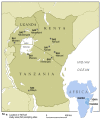Protocol for an interdisciplinary cross-sectional study investigating the social, biological and community-level drivers of antimicrobial resistance (AMR): Holistic Approach to Unravel Antibacterial Resistance in East Africa (HATUA)
- PMID: 34006022
- PMCID: PMC7942251
- DOI: 10.1136/bmjopen-2020-041418
Protocol for an interdisciplinary cross-sectional study investigating the social, biological and community-level drivers of antimicrobial resistance (AMR): Holistic Approach to Unravel Antibacterial Resistance in East Africa (HATUA)
Abstract
Introduction: Antimicrobial resistance (AMR) is a global health threat that requires urgent research using a multidisciplinary approach. The biological drivers of AMR are well understood, but factors related to treatment seeking and the social contexts of antibiotic (AB) use behaviours are less understood. Here we describe the Holistic Approach to Unravel Antibacterial Resistance in East Africa, a multicentre consortium that investigates the diverse drivers of drug resistance in urinary tract infections (UTIs) in East Africa.
Methods and analysis: This study will take place in Uganda, Kenya and Tanzania. We will conduct geospatial mapping of AB sellers, and conduct mystery client studies and in-depth interviews (IDIs) with drug sellers to investigate AB provision practices. In parallel, we will conduct IDIs with doctors, alongside community focus groups. Clinically diagnosed patients with UTI will be recruited from healthcare centres, provide urine samples and complete a questionnaire capturing retrospective treatment pathways, sociodemographic characteristics, attitudes and knowledge. Bacterial isolates from urine and stool samples will be subject to culture and antibiotic sensitivity testing. Genomic DNA from bacterial isolates will be extracted with a subset being sequenced. A follow-up household interview will be conducted with 1800 UTI-positive patients, where further environmental samples will be collected. A subsample of patients will be interviewed using qualitative tools. Questionnaire data, microbiological analysis and qualitative data will be linked at the individual level. Quantitative data will be analysed using statistical modelling, including Bayesian network analysis, and all forms of qualitative data analysed through iterative thematic content analysis.
Ethics and dissemination: Approvals have been obtained from all national and local ethical review bodies in East Africa and the UK. Results will be disseminated in communities, with local and global policy stakeholders, and in academic circles. They will have great potential to inform policy, improve clinical practice and build regional pathogen surveillance capacity.
Keywords: infection control; microbiology; public health; social medicine; urinary tract infections.
© Author(s) (or their employer(s)) 2021. Re-use permitted under CC BY. Published by BMJ.
Conflict of interest statement
Competing interests: None declared.
Figures




References
-
- O’Neill J. Tackling drug-resistant infections globally: final report and recommendations. London, 2016.
-
- GBD 2017 Disease and Injury Incidence and Prevalence Collaborators . Global, regional, and national incidence, prevalence, and years lived with disability for 354 diseases and injuries for 195 countries and territories, 1990-2017: a systematic analysis for the global burden of disease study 2017. Lancet 2018;392:1789–858. 10.1016/S0140-6736(18)32279-7 - DOI - PMC - PubMed
Publication types
MeSH terms
Substances
Grants and funding
LinkOut - more resources
Full Text Sources
Other Literature Sources
Medical
